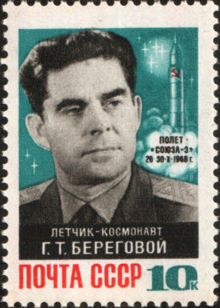Mikhail Beregovoy
Mikhail Beregovoy | |
|---|---|
| Native name | Михаил Тимофеевич Береговой |
| Born | 13 January 1918 Lieutenant General |
| Awards | Twice Order of the Red Banner Order of the Patriotic War First Class Order of the Red Banner of Labour Twice Order of the Red Star Order "For Service to the Homeland in the Armed Forces of the USSR" Third Class Medal "For Battle Merit" |
Mikhail Timofeyevich Beregovoy (Russian: Михаил Тимофеевич Береговой; 13 January 1918 – 30 May 2021) was a Soviet military officer who held a number of posts in the Soviet Air Defence Forces, reaching the rank of lieutenant general.
Born in the upheaval of the October Revolution and the Russian Civil War, Beregovoy became interested in technical innovations. His brothers became pilots, his younger brother Georgy winning fame in the Second World War, and later as a pioneering cosmonaut, and twice Hero of the Soviet Union. Mikhail instead attended the Leningrad Artillery-Technical School and served as an officer with the Soviet Air Defence Forces. Following the war Beregovoy furthered his specialization with studies at the Artillery Radio Engineering Academy, and then joined the Soviet Radio-Technical Forces, in time becoming head of the radio engineering troops of the Moscow Air Defence District, with responsibility for monitoring and providing data for the flights of the early Soviet space program. In 1969 he became head of the Soviet Radio-Technical Forces, a post he held until his retirement in 1983.
Beregovoy reached the age of 100 in 2018, an event marked with congratulatory telegrams, including one from Vladimir Putin. Over his career he had received numerous awards and honors, including two Orders of the Red Banner. He died in 2021 at the age of 103.
Early life and career

Beregovoy was born on 13 January 1918 in
Beregovoy studied at the Leningrad Artillery-Technical School, graduating ahead of schedule in 1939 after the outbreak of the Winter War that year.[2] He was then employed by the school as a cadet unit commander and teacher. Following the Axis invasion of the Soviet Union in 1941, Beregovoy took part in fighting at the front. In 1943 he became a staff officer at a regimental headquarters, and by the end of the war, was serving as a staff officer at the headquarters of the Air Defence's South-Western Front.[1][3][4]
Postwar service
Following the war, Beregovoy enrolled in the Artillery Radio Engineering Academy, graduating in 1951 and entering service with the Soviet Radio-Technical Forces. He rose from the command of a radio engineering regiment to deputy head and then head of the radio engineering troops of the Moscow Air Defence District.[1] He also had responsibility for monitoring and providing data for the flights of the early Soviet space programme. This became particularly important during the Voskhod 2 mission, when the capsule containing cosmonauts Pavel Belyayev and Alexei Leonov overshot their landing zone.[5] Using the radio telemetry they had recorded, Beregovoy and his men were able to guide rescue teams to the location of the landing site.[5]

Between 1969 and 1983 he was head of the Soviet Radio-Technical Forces.[1] Beregovoy retired in 1983, having spent 47 years in the Soviet Armed Forces, 32 of them in various positions in the Radio-Technical Forces.[2] He had been promoted to major general on 22 February 1963, and to lieutenant general on 19 February 1968.[6] He settled in Balashikha, his home since the 1970s.[2]
Retirement and centenary
Beregovoy celebrated his 100th birthday on 13 January 2018, an event attended by veterans and generals. He received a congratulatory telegram from President
Beregovoy died on 30 May 2021 at the age of 103.[1] Over his career he had received numerous honors and awards, including two Orders of the Red Banner, the Order of the Patriotic War First Class, the Order of the Red Banner of Labour, two Orders of the Red Star, the Order "For Service to the Homeland in the Armed Forces of the USSR" Third Class and the Medal "For Battle Merit", among others.[1]
References
- ^ a b c d e f "БЕРЕГОВОЙ Михаил Тимофеевич" (in Russian). Krasnaya Zvezda. 2 June 2021. Retrieved 2 June 2021.
- ^ a b c d e f Seregina, Inna (9 May 2018). "Михаил Береговой: на защите мирного неба Отечества" (in Russian). inbalashikha.ru. Retrieved 2 June 2021.
- ^ "РТВ МО ПВО Mихаил БЕРЕГОВОЙ" (in Russian). vko.ru. Retrieved 2 June 2021.
- ^ "Береговой Михаил Тимофеевич" (in Russian). Bessmertniy Polk. 4 May 2020. Retrieved 2 June 2021.
- ^ a b Vedeneyeva, Natalya (13 January 2021). "Генералу Михаилу Береговому, спасшему космонавта Алексея Леонова, исполнилось 103 года" (in Russian). Moskovskij Komsomolets. Retrieved 2 June 2021.
- ^ Kinzhakov, Ivan (28 October 2019). "Береговой Михаил Тимофеевич" (in Russian). elita-army.ru. Retrieved 2 June 2021.
- ^ a b Karpenko, Kirill (20 January 2018). "Столетний юбилей отметил в Балашихе генерал-лейтенант Михаил Береговой" (in Russian). bbnews.ru. Retrieved 2 June 2021.
